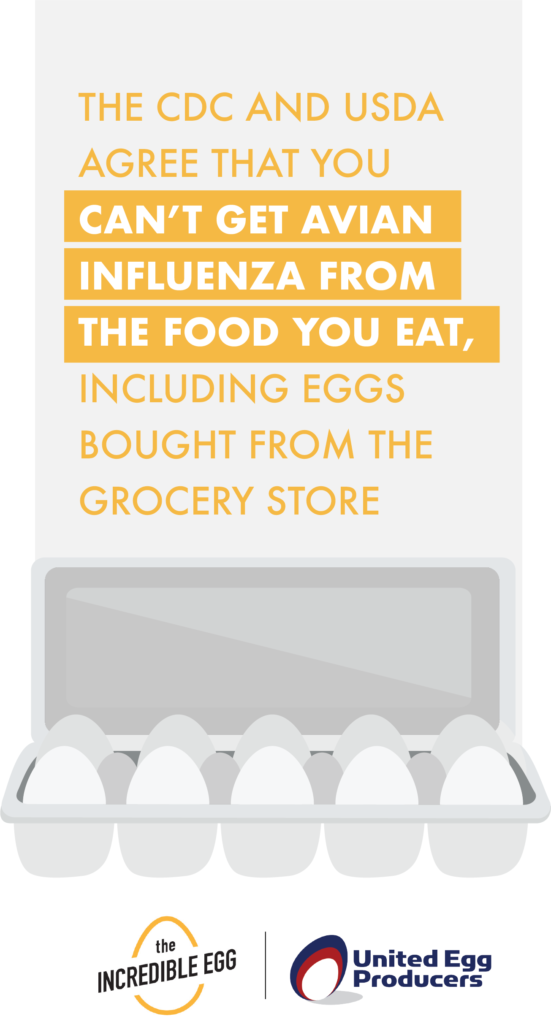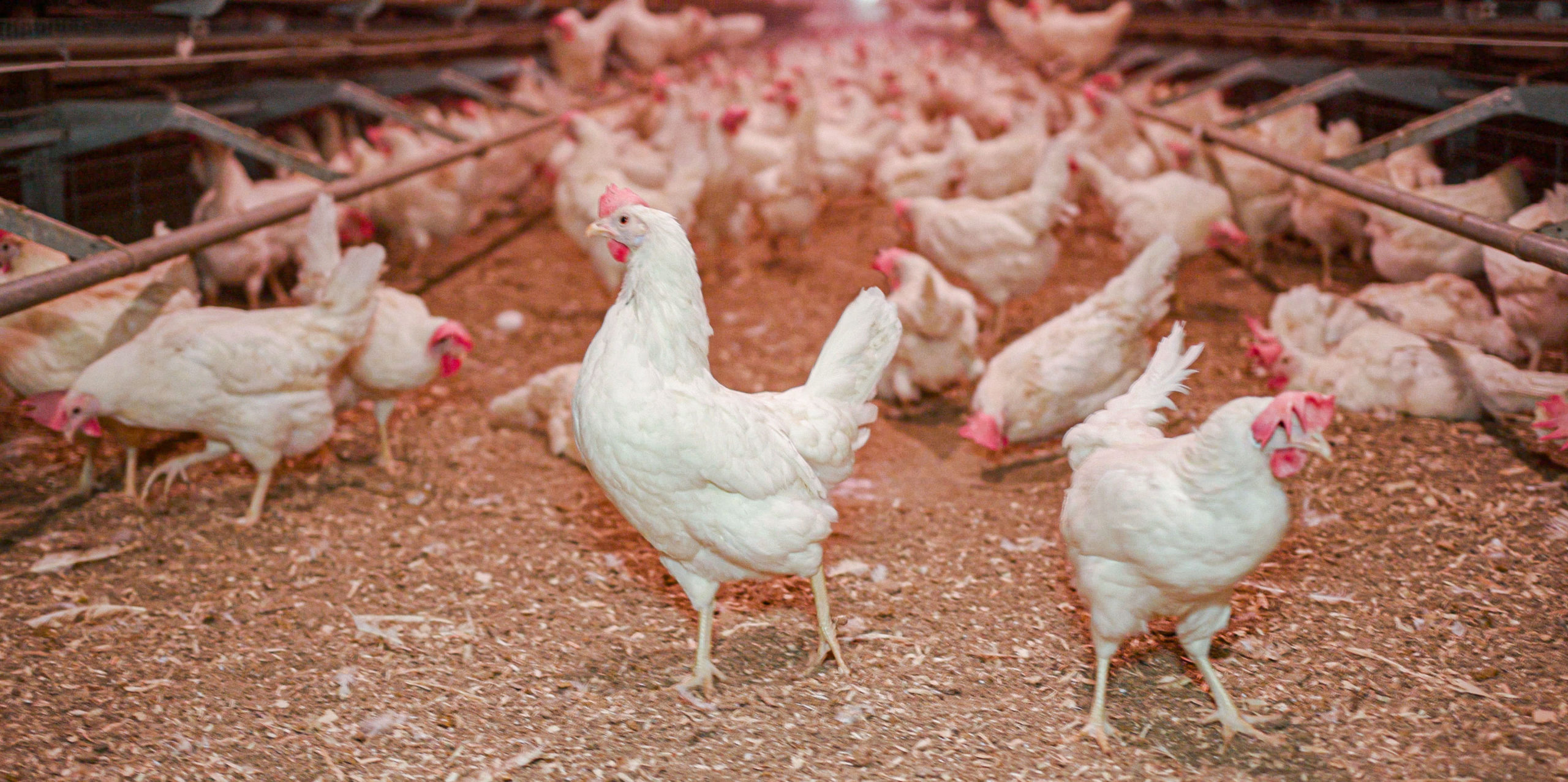What do I need to know about bird flu?
You may have heard about avian influenza or “bird flu” in the news lately—and you have questions. America’s egg farmers are here to answer them.
The first thing you need to know is that both the FDA1 and the USDA2 say consumers can be confident in the safety of eggs, and the CDC3 says the current risk to the public remains low. There is no evidence that bird flu can be transmitted to humans through properly cooked food, including eggs. The likelihood that eggs from infected poultry are in the retail market is low, due to safeguards in place, which include testing of flocks and federal inspection programs.
For media inquiries and assets, click here.
Frequently Asked Questions About Avian Influenza
- What is avian influenza?
-
Avian influenza (AI) — also called “bird flu” — is an infectious disease of birds caused by type A strains of the influenza virus. There are both low-pathogenic and high-pathogenic strains; the strains currently causing concern in the U.S. are highly pathogenic avian influenza (HPAI).
The U.S. is entering its fourth year of fighting the current outbreak of HPAI with the loss of more than 126 million egg-laying hens. Egg farmers continue to double down on biosecurity efforts, but the virality and duration of this outbreak is unprecedented.
- Can I get bird flu from eating eggs or meat?
-
Both the U.S. Department of Agriculture (USDA)1 and Food and Drug Administration2 say consumers can be confident in the safety of eggs. There is no evidence that bird flu can be transmitted to humans through properly cooked food, including eggs. The likelihood that eggs from infected poultry are in the retail market is low, due to safeguards in place, which include testing of flocks and federal inspection programs. To prevent any food borne illness, it is always recommended that people properly store and handle and fully cook meat, poultry and eggs.
- Can humans get bird flu?
-
Human infections with HPAI virus are rare, according to the CDC. Most people will never have direct and prolonged contact with an infected bird. Additionally, U.S. egg farms follow strict safety protocols to protect their workers from exposure to bird flu.
- Where does avian influenza come from and how might it get on an egg farm?
-
Avian influenza is transmitted through infected wild birds and waterfowl, either through direct contact or indirectly if the disease is accidentally carried onto a farm by birds, equipment, vehicles or other means. It can also be carried in mammals and livestock, such as dairy cattle and the movement of animals may also spread the virus.
U.S. egg farms have stringent and comprehensive biosecurity measures to help protect farms from bird flu, but they aren’t foolproof.
- What are America’s egg farmers doing about HPAI?
-
America’s egg farmers work around the clock to protect their hens and farms from bird flu and to ensure the safety of the nation’s egg supply.
Egg farmers and state and federal regulatory authorities work closely together to prevent this disease from affecting American flocks and to catch it early through ongoing surveillance programs.
And comprehensive biosecurity measures are taken on farms to prevent disease every day, not just during a disease outbreak.
- What do farmers do to keep their farms safe from diseases like bird flu?
-
Egg farmers have invested hundreds of millions of dollars in expansive on-farm biosecurity facilities, practices and equipment, including, but not limited to:
- Restricting on-farm access to essential employees only—minimizing risk of the disease being brought into the farm by outside sources.
- Limiting movement (employees, equipment, vehicles, etc.) between farms and barns.
- Supplyingpersonal protective equipment (PPE) to workers and requiring that protective gear always be used by anyone who enters egg farms
- Working closely with animal health experts and veterinarians to continuously monitor the health of their hens.
- Use of Danish entry systems for poultry barns. Washing and sanitizing vehicles and equipment
- Wild bird deterrence efforts
- What about egg farm workers?
-
America’s egg farmers maintain extensive safety practices to protect farm workers from exposure to disease. Protective gear is always required for anyone who enters an egg farm.
- Will the availability of eggs be affected by bird flu?
-
America’s egg farmers are working around the clock fighting bird flu with all their resources and doing everything they can to keep this disease off U.S. egg farms, but bird flu remains a clear and present threat to our nation’s flocks. These unprecedented ongoing outbreaks are affecting egg farms nationwide, making it harder for affected egg farms to recover and get back to production quickly. This has resulted in intermittent out-of-stocks and low supplies in egg cases in many parts of the country, as well as higher prices.
The good news is that egg farmers have a lot of experience working together to move eggs across the country to where they’re needed most—and that’s exactly what they’re doing now. We understand how frustrating it is when eggs are not available on a shopping trip, and we expect any shortages to be localized and short-lived as egg farmers work with their retail customers to replenish those stocks. Since eggs are perishable, deliveries to grocery stores are frequent, and cases are being restocked with fresh eggs often within 24 hours. Find more answers about egg pricing and supply on our website.

Sources
- https://www.fda.gov/food/egg-guidance-regulation-and-other-information/questions-and-answers-regarding-safety-eggs-during-highly-pathogenic-avian-influenza-outbreaks
- https://www.usda.gov/sites/default/files/documents/avian-influenza-food-safety-qa.pdf
- https://www.cdc.gov/bird-flu/spotlights/h5n1-low-risk-public.html

